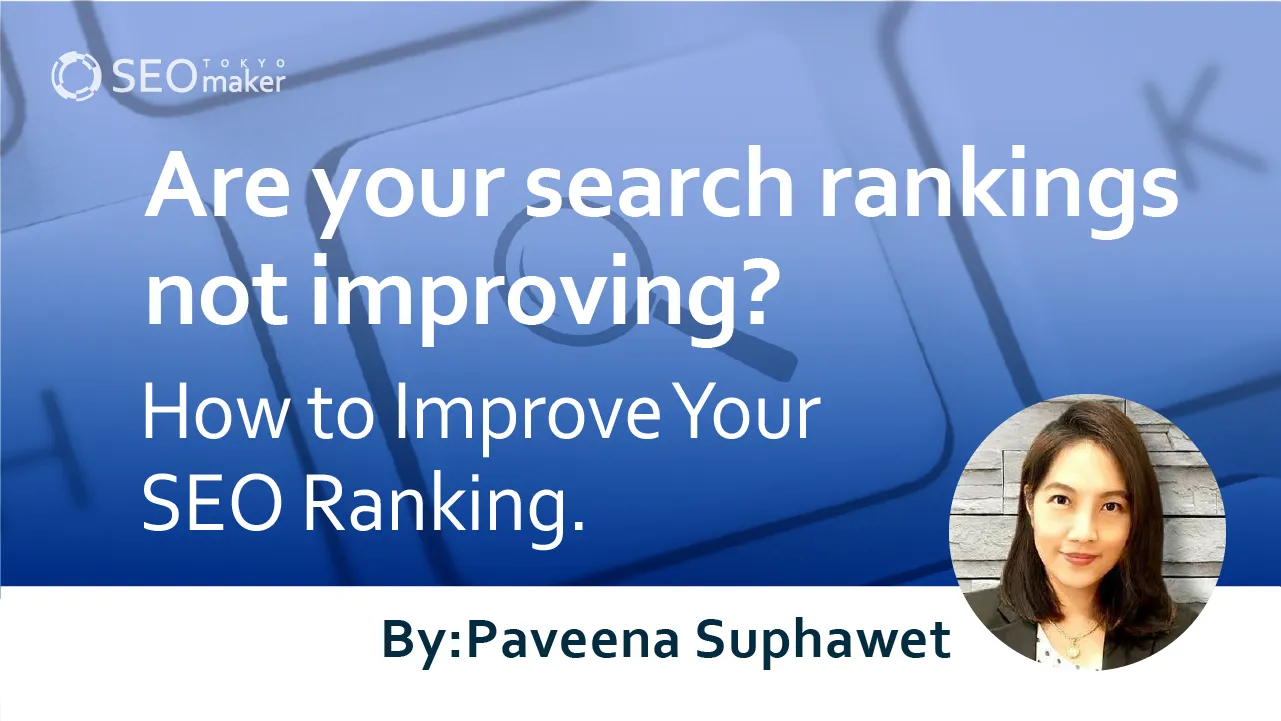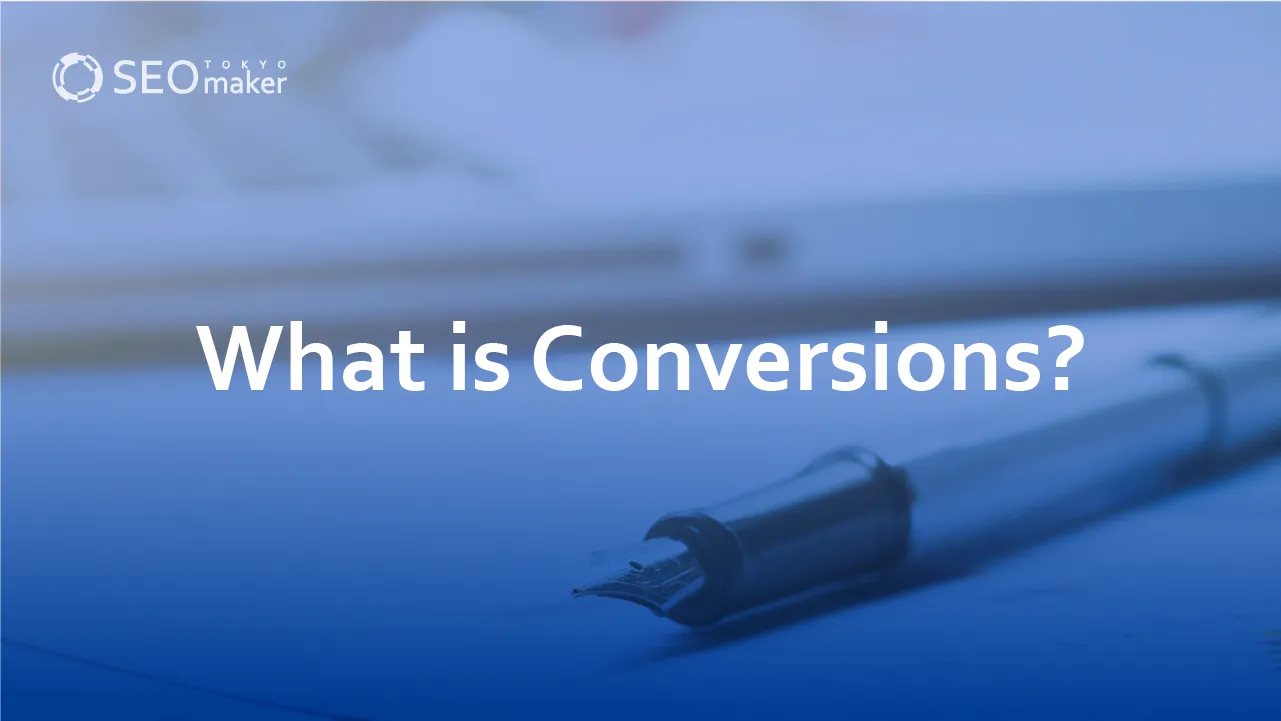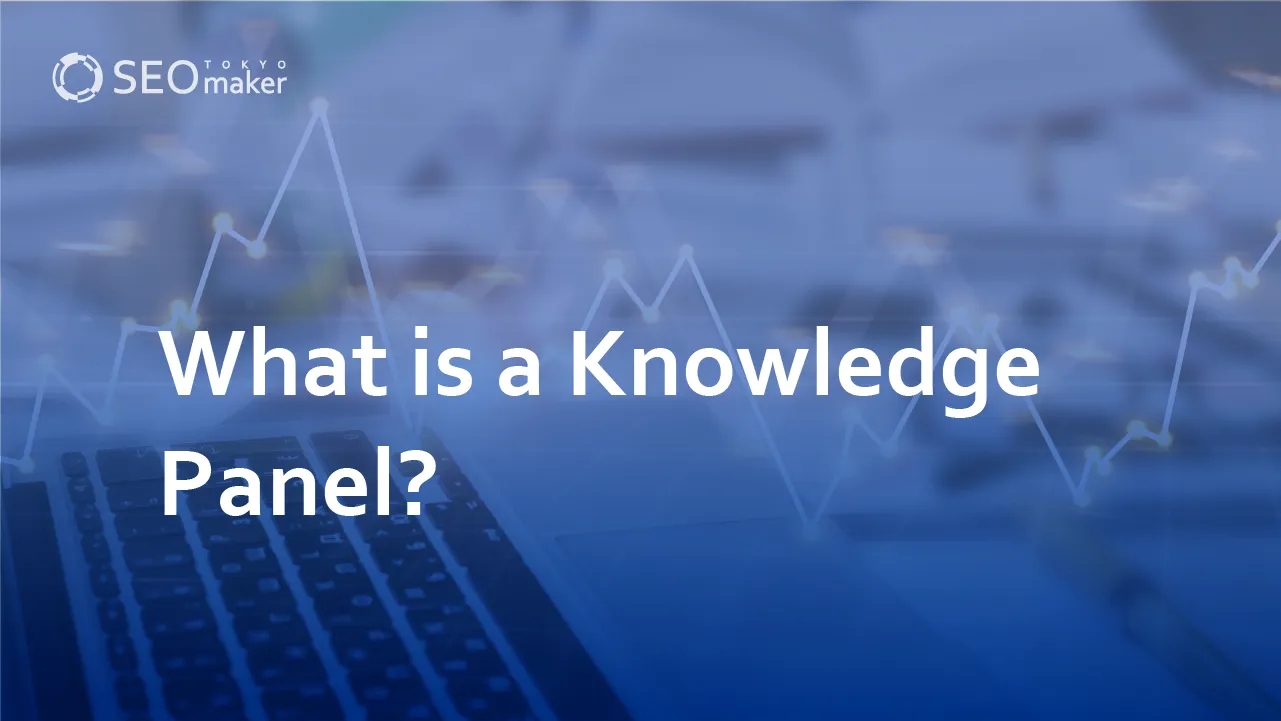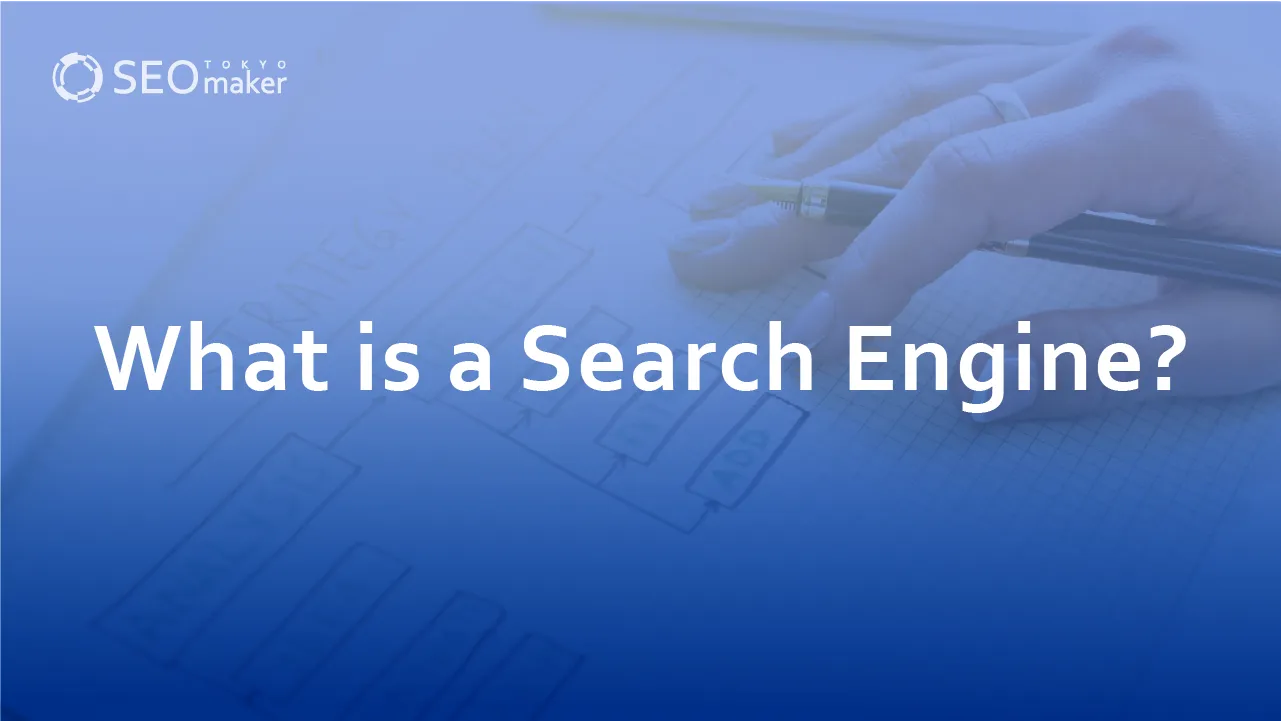Are your search rankings not improving? How to Improve Your SEO Ranking.
contents
- 1 What to Check When Your SEO Ranking Doesn’t Improve
- 2 Ten Reasons Your SEO Ranking Isn’t Improving (Basic Edition)
- 3 Reasons Your Search Ranking Isn’t Improving (Advanced Edition)
- 4 Reasons Your Search Ranking Isn’t Improving (Practical Edition)
- 5 Effective Methods for Improving Search Rankings
- 6 Summary

After years in the SEO field, a common concern many face is the inability to improve their search engine ranking. Despite researching online, the generic advice of “not capturing user needs” is often found, but many struggle with what specific actions to take.
Consulting with an SEO expert is one option, yet defining what makes someone “knowledgeable in SEO” can become a philosophical debate. It’s odd to mention in an article by an SEO company, but be wary of those who claim to be experts in SEO without showing tangible results.
Here, Tokyo SEO Maker will explain specifically what aspects to review and what actions to take to enhance your SEO.
What to Check When Your SEO Ranking Doesn’t Improve
If your efforts don’t seem to raise your SEO ranking, it’s possible you’re employing the wrong strategies. To improve your ranking, a focus on SEO is crucial, which means understanding Google is essential. We’ll delve into what to check if your SEO ranking doesn’t improve.
Google’s Ten Truths
These ten points discuss the foundational ideas and concepts of SEO, highlighting what Google looks for in valuable content for users.
Google’s Ten Truths
SEO Starter Guide
This guide outlines specific SEO strategies and methods. It’s a must-read for a basic understanding of SEO.
SEO Starter Guide
Quality of Content from a User Perspective
The quality of content is crucial, considering whether it provides valuable information or solves questions from a user’s perspective.
In creating content, ensure you’re not solely prioritizing what you wish to communicate.
Providing content that is valuable and considers the user’s perspective aligns with what search engines seek, making it effective for SEO. Additionally, valuable content can lead to user actions like sharing and spreading through social media, aiming for higher search rankings.
21 Items to Check When Creating Content for a High SEO Ranking
Ten Reasons Your SEO Ranking Isn’t Improving (Basic Edition)
Here are ten basic reasons why your SEO ranking might not be improving, all of which are essential for SEO.
- Your site has been newly established.
- Your title doesn’t contain keywords.
- Your headings lack keywords.
- There’s insufficient information.
- There are too few internal links.
- There’s a mismatch with search intent.
- The number of indexed pages is insufficient.
- There’s insufficient domain power.
- Your site has received a penalty.
- There are too few external links.
When Your Site Is Newly Established
If your site is newly launched, it may not appear in search results due to not being indexed yet. If your site doesn’t show up in search results at all, check by entering your URL in the “Sitemap” section of Google Search Console .
If not indexed, it’s recommended to submit your sitemap yourself.
To submit a sitemap, first, create one automatically using XML. Then upload and submit it through Google Search Console.
For detailed instructions on submitting a sitemap, refer to “Creating and submitting a sitemap” on the official Google site.
Your Title Lacks Keywords
Crafting your title can increase click-through rates and attract attention, but if your targeted keywords aren’t included in the title, your search ranking won’t improve.
It’s said that HTML tags don’t affect search rankings, but missing keywords in your title is a significant loss. However, stuffing keywords is not advisable.
Effective Ways to Add SEO Titles” for more information
Your Headings Lack Keywords
If your headings (h2 tags, h3 tags) lack keywords, consider how you might include them. It’s said that heading tags don’t directly affect search rankings, but they’re crucial for search engines to understand your content.
If unsure how to proceed, try including keywords in all your h2 tags as a start.
Refer to “The Role of Heading Tags in SEO” for more information.
Insufficient information
Word count does not correlate directly with search rankings. However, the amount of information within content does affect rankings because it relates to whether user needs are met by searching for a keyword.
Simply adding more information without coherence can be problematic, but supplementing missing information can make your content more comprehensive and better rated.
The specific word count varies significantly by field, but a minimum of 1000 words, preferably around 3000 words, is generally necessary for comprehensive coverage.
SEO and the Relationship with Page Numbers: Differences in Index Numbers and Considerations
Too Few Internal Links
Always include internal links when creating content. Linking from the homepage or categories is essential, but links from related articles are also necessary.
It’s easy to forget, but linking from newly published articles to other articles is crucial. If possible, linking mutually between related articles strengthens their relationship.
What Are Internal Links? Points for Strengthening SEO with Internal Links
A Mismatch with Search Intent
Matching search intent is now considered essential in SEO, but articles that don’t align with search intent won’t rank well. To understand search intent, it’s advisable to refer to competitor articles, look at suggestions, and related terms.
In essence, even if all other elements are lacking, high match rates with search intent can still achieve high rankings.
The Importance of Search Intent in SEO: From Research Methods to Application
Insufficient Index Numbers
The number of indexed pages (page count) does not directly relate to SEO. However, creating multiple related article s and linking them internally indicates to search engines that your site or category is highly relevant, enhancing its rating.
For keywords with significant search volumes, the number of indexed pages can impact rankings. It’s also helpful to refer to the index numbers of competitor sites, but keep in mind that these numbers can be significantly influenced by the site’s age and update frequency.
Ensure to consider what users need and aim for a reasonable number of indexed pages.
SEO and the Relationship with Page Numbers: Differences in Index Numbers and Considerations
Insufficient Domain Power
Domain power is mentioned broadly here, but it lacks a clear definition. Simply put, well-developed sites can rank well even with subpar content, while new sites may struggle to rank even with highly refined articles.
Domain age does not directly affect SEO, but a certain period after site launch is indeed necessary, along with external factors like backlinks and which also influence rankings.
The Relationship Between SEO and Domain: Does Domain Affect Search Ranking?
Receiving a Penalty
You can check if your site has received a penalty through Google Search Console. However, this only shows manual penalties, not automatic ones.
Manual penalties are typically applied by Google (by human review) for manipulative link practices. Reports of manual penalties have decreased around 2020 (based on personal observation), they were more common before.
Automatic penalties are applied mechanically when certain thresholds are exceeded due to irregular site operations. Whether you’re under an automatic penalty is not visible, nor when it might be lifted. However, operating normally should generally avoid automatic penalties.
What is an SEO Penalty?
Lacking External Links
To improve SEO ranking, acquiring external links is indispensable. Known as off-page SEO or link building, acquiring external links can be challenging. Internationally, there’s a technique known as the Skyscraper Technique for obtaining external links. To gain links from media, you can rely on SEO companies that manage owned media or resort to advertising to secure links.
Reasons Your Search Ranking Isn’t Improving (Advanced Edition)
The content explained in the basic edition applies universally as a standard answer. If you’re a diligent web manager and have checked all the basics but still find “My search ranking won’t improve!” then it’s time for the advanced edition. Depending on the situation, it might indeed be difficult to take action. Let’s check these seven points:
- High bounce rate and short page dwell time
- What external measures are being taken
- Differences from competitors
- Readability
- Sufficiency of EAT
- Whether it falls under the YMYL category
- Presence of uniqueness
High Bounce Rate and Short Page Dwell Time
A high bounce rate and short dwell time users are quickly leaving your site, which can be improved to enhance search ranking.
Bounce rate and dwell time data can be checked via Google Analytics. High bounce rates and short dwell times could mean:
-The title and content were mismatched
-The content wasn’t what was sought
-The page loaded too slowly
Often, it’s because the content didn’t meet the user’s needs. As a remedy, conduct market and needs analysis again to improve content quality.
External Measures
External measures typically refer to how external links are collected, but broadly, it also
includes citations, SNS operations, and all non-internal measures.
If actively acquiring external links, ensure there are no dubious methods involved. Check for self-made links, an abnormal number of links from free blogs, or gathering mutual links.
“Dubious methods” may seem vague, but if it’s something you can proudly explain on your site as part of PR activities, it shouldn’t be a problem. Conversely, if it’s content you can’t discuss openly, it may negatively affect SEO.
Differences from Competitors
Consider thoroughly what differentiates your site from those ranking higher, both in terms of UI/UX and essential site elements. For example, if all competitors within the top 10 have content that your site lacks, it’s possible you need that content to rank higher.
Beyond content, deeply analyze what might be lacking in your site to uncover necessary elements for improvement.
Readability
Readability is crucial, affecting UI/UX. If text is too small, lines too close, insufficient breaks, buttons too close together, excessive contact options, or colors too faint, content readability impacts bounce rates and dwell times.
High bounce rates suggest shorter dwell times, potentially lowering your overall ranking.
Is E-A-T Sufficient?
E-A-T stands for Experience, Expertise, Authoritativeness, and Trustworthiness.
If your content lacks based on the author’s experience, lacks expertise, authority, or trustworthiness, it may struggle to rank well. Expertise involves depth of exploration, authority who is disseminating, and trustworthiness whether the content is credible.
For instance, doctors are trusted and experts but wouldn’t be consulted for SEO. SEO inquiries would go to web marketing or SEO companies, which relates to E-A-T.
Is It a YMYL Field?
YMYL stands for Your Money or Your Life, indicating genres with significant life impacts, such as medical, legal, financial, and education sectors, to name a few. Depending on the situation, the consultation varies. For example, if you are not feeling well, you may consult a doctor; if you need legal advice, you may consult a lawyer. This applies to SEO, where sufficient expertise is required to rank in YMYL fields.
Even if you’re running a medical or legal media by professionals, ranking difficulties can occur. This might be due to insufficient authority in the field or failure to convey this authority to search engines.
Presence of Uniqueness
Even if all the above are met, a lack of uniqueness in the site or articles can hinder ranking improvement. Uniqueness isn’t just about avoiding duplicate content; it’s about offering something exclusive to your site.
Without uniqueness, users may fulfill their needs elsewhere, leading search engines to lower your ranking.
Reasons Your Search Ranking Isn’t Improving (Practical Edition)
Even after addressing basic and advanced content, many struggle with non-improving rankings. If the cause remains elusive, consider these three strategies:
1. Lack of love and passion
2. Taking a break
3. Consulting an SEO company
Lack of Love and Passion
While it may sound trivial, passion for your site is vital in SEO. Those with genuine love for their site are willing to try various methods until rankings improve. This isn’t about mere sentiment; genuine engagement with your site is a crucial element.
Taking a Break
It might seem counterintuitive, but taking a break can sometimes lead to solutions. SEO’s impact timing is uncertain, and acting without seeing results can lead to skepticism from within the company.
However, if you’ve done everything and your ranking still isn’t improving, it’s possible that the search engine’s recognition is lacking. Building up E-A-T takes time, and evaluations may significantly change with core updates from search engines.
It is never a bad choice to temporarily set aside past strategies to assess their effectiveness and use that time to prepare alternatives.
Consulting with an SEO Company
Though it may be difficult for SEO companies to broach, consulting with one could lead to problem resolution. SEO firms often have numerous similar cases and may offer unexpected solutions through initial free consultations.
While monthly consultation fees might seem high, it’s not necessarily costly as some firms offer affordable rates for initial diagnosis and proposed solutions, not just monthly consultations.
Effective Methods for Improving Search Rankings
To improve search rankings, it’s essential to have high-quality content that provides value to users, surpassing that of competing sites. Here, we will delve into effective methods for boosting search rankings.
Conduct Thorough Competitor and Keyword Analysis
Depending on the genre and target keywords, the content users seek can vary. To accurately provide the content users are looking for, it’s crucial to conduct a thorough analysis of competitors and keywords.
The difference between content that has been meticulously analyzed and content that has been subjectively created can significantly affect search rankings. While thorough analysis is not easy, there are many free tools available nowadays, so it’s recommended to actively utilize them to create content that meets user demands.
Rewrite Published Articles
If your site’s content quantity has increased but search rankings have stagnated, revisiting and rewriting the content of already published articles can be effective. In the realm of search engines, contents are subject to the effects of Google updates and changes in user needs.
Therefore, maintaining the quality of content through rewriting, based on the latest market analysis, can ensure your content remains relevant. This applies even to articles that already rank high in search results, so it’s advisable to periodically rewrite your content.
Create High-Quality Original Content
The ideal form of content that ranks high in search results is high-quality original content. While various SEO strategies are effective, the most crucial essence is not to be mistaken.
In extreme cases, high-quality original content can aim for top search rankings even without comprehensive SEO strategies. Since SEO measures can be added later and still be effective, focus first on creating high-quality original content that surpasses all competitor sites.
Summary
If your search rankings aren’t improving, there could be many factors at play, so it’s essential to carefully check each item. Common reasons include content that is difficult for users to read or content quality that is inferior to competitor sites. Reanalyze your target keywords and competitor sites, and improve through article rewriting. Moreover, if you’re unaware of the criteria Google uses to evaluate content, you won’t be able to create high-quality content. It’s also recommended to revisit Google’s principles, as you may unwittingly be creating content far from what is considered valuable without realizing it.






![A comprehensive explanation of keyword selection [for beginners]. How to approach keyword selection, tools to utilize, and tips for success](https://www.switchitmaker2.com/en/wp-content/uploads/2024/05/62_sumne-150x150.webp)



![What is a Description? Explaining the Meaning, Writing Style, and Changing Word Count – [2023 Edition]](https://www.switchitmaker2.com/en/wp-content/uploads/2024/09/what-is-description.webp)










